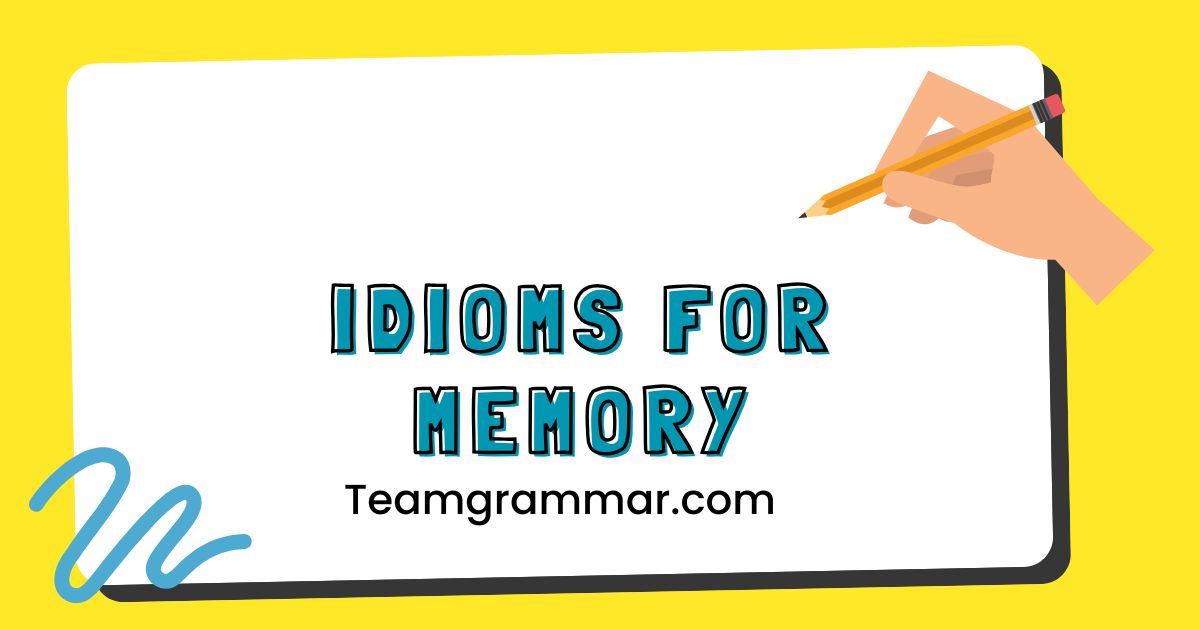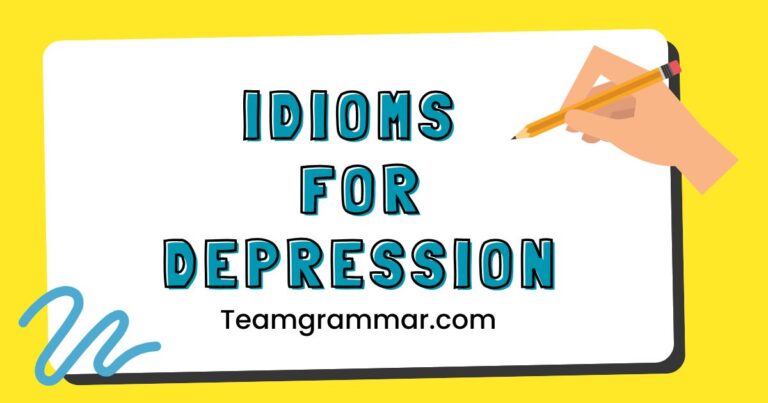35 Idioms for Memory: Enhance Recall & Understanding
Idioms offer a colorful and engaging way to discuss memory, recall, and forgetfulness in the English language. Understanding these expressions not only enriches your vocabulary but also provides insight into how native speakers conceptualize memory.
This article delves into a variety of idioms related to memory, exploring their meanings, origins, and proper usage. Whether you are an English language learner or a seasoned speaker, mastering these idioms will enhance your communication skills and comprehension of nuanced conversations.
Table of Contents
- Introduction
- Definition of Idioms for Memory
- Structural Breakdown
- Types and Categories
- Examples
- Usage Rules
- Common Mistakes
- Practice Exercises
- Advanced Topics
- FAQ
- Conclusion
Definition of Idioms for Memory
Idioms are expressions whose meanings cannot be understood from the literal meanings of the individual words. They are a figurative way of speaking that adds color and depth to language.
Idioms related to memory specifically refer to the ability to recall information, the act of forgetting, the clarity of one’s memories, and the general state of one’s cognitive abilities related to remembering. These idioms are often deeply rooted in cultural and historical contexts, reflecting how societies perceive and value memory.
These idioms function as compact, evocative ways to describe complex cognitive processes. Instead of stating plainly that someone has a good memory, you might say they have “a memory like an elephant.” This not only conveys the strength of their memory but also adds a layer of imagery and personality to the description.
The context in which these idioms are used is crucial for understanding their intended meaning. Using them correctly can significantly enhance your communication, making it more engaging and relatable.
Structural Breakdown
The structure of idioms for memory, like most idioms, varies widely. Some are simple phrases, while others are more complex clauses.
Understanding the grammatical structure is less about parsing individual words and more about recognizing the entire phrase as a unit of meaning. These idioms often employ metaphors, similes, and other figures of speech to convey their message.
For example, consider the idiom “to jog someone’s memory.” Grammatically, it’s a verb phrase. However, its meaning isn’t about literally jogging.
Instead, it means to prompt someone to remember something. The key is to understand the figurative meaning and how it functions within a sentence.
Types and Categories
Idioms for memory can be categorized based on the aspect of memory they describe. Here are some common categories:
Idioms About Remembering
These idioms describe the act of successfully recalling information or experiences.
Idioms About Forgetting
These idioms describe the act of failing to recall information or experiences.
Idioms About Sharp Memory
These idioms describe having a strong or excellent memory.
Idioms About Vague Memory
These idioms describe having a weak or unclear memory.
Examples
Below are several examples of idioms related to memory, categorized for clarity.
Examples of Idioms About Remembering
The following table provides examples of idioms related to remembering, along with their meanings and example sentences.
| Idiom | Meaning | Example Sentence |
|---|---|---|
| To ring a bell | To sound familiar; to trigger a memory | The name “Emily Carter” doesn’t ring a bell. |
| To jog someone’s memory | To prompt someone to remember something | Showing him old photos might jog his memory about the trip. |
| To come to mind | To be remembered; to occur to someone | Her birthday completely slipped my mind, but then it suddenly came to mind. |
| Cross my mind | To occur briefly as a thought | It did cross my mind that he might be lying. |
| On the tip of my tongue | About to be remembered but not quite | I know her name, it’s on the tip of my tongue! |
| Fresh in one’s memory | Easily remembered; recently experienced | The accident is still fresh in her memory. |
| Bear in mind | To remember something important | Bear in mind that the deadline is next Friday. |
| Keep in mind | To remember something important | Keep in mind that the store closes early on Sundays. |
| Stick in one’s mind | To be easily remembered | That song has really stuck in my mind. |
| Etched in one’s memory | Permanently remembered | The day we met is etched in my memory forever. |
| Recall to mind | To actively remember something | I tried to recall to mind where I had left my keys. |
| Bring back memories | To cause someone to remember past events | This old song brings back memories of my childhood. |
| Remind me | Prompt me to remember | Remind me to buy milk when we go to the store. |
| Call to mind | To remember or recall | I can’t quite call to mind what he looked like. |
| Fix in the memory | To permanently store in one’s memory | He tried to fix the details of her face in his memory. |
| Memorize | To learn by heart | The students were asked to memorize the poem. |
| Learn by rote | To memorize without understanding | He learned the multiplication tables by rote. |
| Commit to memory | To make an effort to remember something | She committed the phone number to memory. |
| Hold in remembrance | To remember someone fondly | We hold her in remembrance every year on her birthday. |
| Retain information | To keep information in one’s memory | Some students find it difficult to retain information they read. |
| Keep a mental note | To remember something important | I made a mental note to call her later. |
| Register in one’s mind | To become consciously aware of something and remember it | The importance of the event didn’t fully register in my mind until later. |
| Plant a seed in someone’s memory | To introduce an idea or thought that someone will remember later | He planted a seed in her memory about the possibility of a promotion. |
| Have a flash of insight | To suddenly remember or understand something | She had a flash of insight and suddenly remembered where she had left her keys. |
| Conjure up memories | To bring memories to one’s mind | The old photographs conjured up memories of her childhood. |
Examples of Idioms About Forgetting
The table below illustrates idioms related to forgetting, highlighting their meanings and providing context through example sentences.
| Idiom | Meaning | Example Sentence |
|---|---|---|
| Slip one’s mind | To be forgotten | Her birthday completely slipped my mind. |
| Go in one ear and out the other | To be heard but not remembered | I told him to clean his room, but it went in one ear and out the other. |
| Blanking out | To forget something temporarily | I was so nervous during the presentation that I completely blanked out. |
| Lost my train of thought | To forget what one was saying | I’m sorry, I’ve lost my train of thought. |
| Out of sight, out of mind | If something is not visible, it’s easily forgotten | He moved away, and it was a case of out of sight, out of mind. |
| Fall through the cracks | To be forgotten or overlooked | Important details often fall through the cracks when dealing with large projects. |
| Erase from memory | To deliberately try to forget something | He tried to erase the painful experience from his memory. |
| Forget all about it | To completely forget something | I meant to call her back, but I forgot all about it. |
| Have a senior moment | To have a brief lapse in memory, typically associated with older age | I had a senior moment and couldn’t remember where I parked the car. |
| It escapes me | I cannot remember it | His name escapes me at the moment. |
| Clean forget | To completely forget | I had a clean forget about the meeting. |
| Draw a blank | To fail to remember something | When asked about the incident, he drew a blank. |
| Let it go | To stop thinking about something | It’s in the past, just let it go. |
| Obliterate from memory | To completely erase from one’s memory | She wanted to obliterate the traumatic event from her memory. |
| Lose track of | To forget or be unaware of something | I lost track of time while reading the book. |
| Never crossed my mind | I never thought about it | It never crossed my mind that he wouldn’t come. |
| Blot out of one’s mind | To intentionally block a memory | She tried to blot out the horrifying scene from her mind. |
| Become a distant memory | Something that is fading from memory | The vacation has become a distant memory. |
| Leave my mind | To exit one’s consciousness or memory | The details of the conversation have started to leave my mind. |
| A memory fades | A memory becomes less clear over time | The memory of that day has started to fade. |
| Be consigned to oblivion | To be completely forgotten | That old law has been consigned to oblivion. |
| Not give a second thought | To not think about something again | I didn’t give it a second thought after I left. |
| Be ancient history | Something that happened a long time ago and is no longer relevant | That argument is ancient history now. |
| Be water under the bridge | Something that happened in the past and is no longer important | Yes, we argued, but it’s water under the bridge now. |
Examples of Idioms About Sharp Memory
The following table presents idioms that describe a sharp, keen, or excellent memory, with illustrative sentences.
| Idiom | Meaning | Example Sentence |
|---|---|---|
| Memory like an elephant | A very good memory | She has a memory like an elephant; she never forgets a face. |
| Sharp as a tack | Very intelligent and quick-witted | Despite her age, she’s still as sharp as a tack. |
| A mind like a steel trap | An excellent memory; able to remember everything | He’s got a mind like a steel trap; he never forgets anything. |
| Keep track of everything | To remember everything | She can keep track of everything that goes on in the office. |
| Never forget a face | To always remember people’s appearances | He never forgets a face, which is impressive considering how many people he meets. |
| Have a good head for figures | To be good at remembering numbers | She has a good head for figures and easily remembers complex calculations. |
| Have total recall | To be able to remember everything perfectly | The witness had total recall of the events that transpired that night. |
| Recall every detail | To remember even the smallest details | He could recall every detail of the meeting, even months later. |
| Photographic memory | The ability to recall images with great accuracy | He seems to have a photographic memory; he can instantly remember what he reads. |
| Remarkable memory | An unusually good memory | She has a remarkable memory for historical dates. |
| Unfailing memory | A memory that never fails | He has an unfailing memory for names and faces. |
| Retentive memory | A memory that retains information well | She has a retentive memory and can easily learn new languages. |
| Keep a running tally | To keep a continuous record or memory | She keeps a running tally of all her expenses. |
| A memory like a computer | A memory that stores and recalls information efficiently | He has a memory like a computer, storing and retrieving information with ease. |
| Vivid recollection | A clear and detailed memory | She had a vivid recollection of her childhood summers. |
Examples of Idioms About Vague Memory
This table presents idioms that describe a vague, unclear, or poor memory, with example sentences to illustrate their usage.
| Idiom | Meaning | Example Sentence |
|---|---|---|
| Hazy memory | An unclear or vague memory | I have a hazy memory of that day. |
| Fuzzy recollection | An indistinct or unclear memory | My recollection of the event is a bit fuzzy. |
| Clouded memory | A memory that is obscured or unclear | Time has clouded my memory of that summer. |
| Dim and distant | Something that is fading from memory | The details of the accident are now dim and distant. |
| Poor memory | A bad memory | I have a poor memory for names. |
| Memory like a sieve | A very bad memory; easily forgets things | She has a memory like a sieve; she can’t remember anything. |
| Memory lapses | Brief failures of memory | As he got older, he started experiencing memory lapses. |
| Brain is fried | To be unable to think clearly due to exhaustion or stress | After studying all night, my brain is completely fried. |
| Mind is going blank | To be unable to remember anything | When I stood up to speak, my mind went completely blank. |
| Can’t for the life of me remember | Unable to remember something no matter how hard one tries | I can’t for the life of me remember where I put my keys. |
| It’s all a blur | A series of events that are difficult to distinguish or remember | The party was so chaotic; it’s all a blur now. |
| Vague impression | An unclear or indefinite memory | I have only a vague impression of what happened. |
| Fragmentary memory | A memory that is incomplete or broken | She has only fragmentary memories of her childhood. |
| Fleeting memory | A memory that passes quickly and is easily forgotten | I had a fleeting memory of the incident, but it quickly disappeared. |
| Slip from recollection | To be forgotten over time | The details of our conversation began to slip from my recollection. |
| Have thin memories | To have weak or sparse memories | He has thin memories of his early childhood. |
| Not ring any bells | To not trigger any memories or recognition | The name doesn’t ring any bells with me. |
Usage Rules
Using idioms correctly involves understanding not only their meaning but also their appropriate context. Here are some key rules to remember:
- Context is Key: Idioms are highly context-dependent. Make sure the situation warrants the use of figurative language.
- Audience Awareness: Consider your audience. Some idioms may not be familiar to non-native speakers or younger audiences.
- Tense and Grammar: Adapt the idiom to fit the grammatical structure of your sentence. For example, “jog someone’s memory” can be conjugated to “jogged her memory.”
- Overuse: Avoid overuse of idioms, as it can make your speech sound unnatural or forced.
Common Mistakes
Here are some common mistakes to avoid when using idioms related to memory:
| Incorrect | Correct | Explanation |
|---|---|---|
| “It rings a bell to me.” | “It rings a bell.” | The preposition “to me” is redundant. |
| “I slipped my mind.” | “It slipped my mind.” | The subject should be the information that was forgotten, not the person. |
| “He has a memory like a elephant.” | “He has a memory like an elephant.” | Correct the article “a” before “elephant.” |
| “My brain is frying.” | “My brain is fried.” | The correct form is “fried,” not “frying.” |
Practice Exercises
Test your understanding of memory idioms with these exercises.
| Question | Correct Answer |
|---|---|
| 1. The name _____, but I can’t quite place him. | rings a bell |
| 2. I completely _____ about our appointment. | forgot all about it |
| 3. She has a _____; she never forgets anything. | memory like an elephant |
| 4. After the accident, the events were _____. | all a blur |
| 5. Can you _____ where you left your keys? | recall to mind |
| 6. The details of the meeting _____. | slipped my mind |
| 7. The teacher told the students to ____ the poem. | commit to memory |
| 8. The importance of the news didn’t fully _____ until later. | register in my mind |
| 9. Seeing her childhood home _____. | brought back memories |
| 10. His explanation ____, and I understood everything clearly. | jogged my memory |
Advanced Topics
For advanced learners, delve deeper into the etymology and cultural significance of memory idioms. Research the historical context in which these idioms originated and how their meanings have evolved over time.
Explore how different cultures express similar concepts using their own unique idioms and expressions. Additionally, analyze the use of memory idioms in literature and film to understand how they contribute to character development and narrative depth.
Understanding the nuances of these idioms can elevate your comprehension and usage of the English language to a more sophisticated level.
FAQ
- What is the difference between an idiom and a proverb?
An idiom is a phrase whose meaning is different from the literal meanings of its individual words, while a proverb is a short, well-known saying that expresses a general truth or piece of advice. Idioms are figurative expressions, while proverbs are statements of wisdom or common sense.
- How can I improve my understanding of idioms?
Read widely, listen to native speakers, and pay attention to the context in which idioms are used. Keep a notebook of new idioms you encounter and practice using them in your own speech and writing. Use online resources and idiom dictionaries to look up unfamiliar expressions.
- Are idioms the same in all English-speaking countries?
No, idioms can vary significantly between different English-speaking countries. Some idioms are common across all regions, while others are specific to certain countries or regions. Be aware of these regional variations to avoid misunderstandings.
- Is it okay to use idioms in formal writing?
The use of idioms in formal writing depends on the context and audience. In general, it’s best to avoid idioms in highly formal or academic writing, as they can be perceived as informal or colloquial. However, in less formal writing, such as articles or blog posts, idioms can add color and personality to your writing.
- How do I know when to use an idiom?
Use idioms when you want to add color, expressiveness, or emphasis to your speech or writing. Make sure the idiom is appropriate for the context and audience, and that you understand its meaning and usage correctly. Avoid overuse of idioms, as it can make your language sound unnatural or forced.
- What should I do if I don’t understand an idiom?
Look it up in an idiom dictionary or online resource. Pay attention to the context in which the idiom is used, and ask a native speaker for clarification if needed. Don’t be afraid to ask for help; it’s a sign of your commitment to learning.
- Why are idioms so difficult to learn?
Idioms are difficult to learn because their meanings cannot be deduced from the literal meanings of their individual words. They often have cultural or historical origins that are not immediately obvious. Learning idioms requires memorization, exposure to the language, and an understanding of cultural context.
- Can idioms have multiple meanings?
Yes, some idioms can have multiple meanings depending on the context. It’s important to pay attention to the surrounding words and phrases to determine the intended meaning of the idiom. Consulting a dictionary or native speaker can help clarify any ambiguity.
- Are there any resources for learning idioms?
Yes, there are many resources available for learning idioms, including idiom dictionaries, online databases, textbooks, and language learning apps. Look for resources that provide definitions, examples, and practice exercises to help you master idioms.
Conclusion
Mastering idioms related to memory can significantly enhance your English communication skills. By understanding these colorful expressions, you can express nuanced thoughts and ideas about memory, recall, and forgetfulness in a more engaging and relatable way.
Remember to pay attention to context, audience, and proper usage to avoid common mistakes. Practice using these idioms in your own speech and writing to solidify your understanding and fluency.
Continue to expand your vocabulary and explore the rich tapestry of the English language. Embrace the challenge of learning new idioms and expressions, and you’ll find your communication skills growing stronger and more vibrant.
With consistent effort and practice, you can unlock the power of idioms and become a more confident and effective communicator.







